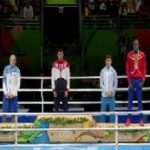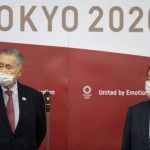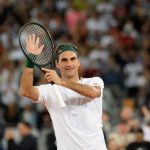Tokyo Olympics organizers are preparing to host the Games next year even if the global coronavirus pandemic hasn’t eased substantially, organizing committee chief executive Toshiro Muto said on Tuesday.
The Tokyo Olympics had been scheduled to start on Friday but were put back to 2021 because of the pandemic.
Since then, organizers have scrambled to rearrange an event that has been almost a decade in the making whilst trying to ensure next year’s Olympics are safe for athletes, officials, and supporters.
Muto said that although organizers hoped the threat posed by the virus could be reduced, nobody knows what the situation will be when the Games start on July 23, 2021.
Organizers are assuming coronavirus will remain a major problem.
“It is rather difficult for us to expect that the coronavirus pandemic is contained,” Muto told Reuters. “But if we can deliver the Games in Tokyo with coronavirus, Tokyo can be the role model for the next Olympic Games or other various international events.”
Muto said he hoped Tokyo 2020 could be the benchmark in a post-pandemic world.
“By delivering the Games successfully in Tokyo we strongly hope that can create a legacy that is in the history of mankind.”
The delay to the Games will incur additional costs for organizers.
The International Olympic Committee has already estimated that the postponement will cost them $800 million but the Japanese side has been less forthcoming in giving exact figures.
Muto said the final figure wouldn’t be known until December but hoped that bringing on new sponsors, despite the grim economic forecast, would help bridge the gap.
“I know that businesses are in dire circumstances because of coronavirus but still there are companies who are coming forward to say they want to sponsor the Games, which we appreciate very much,” Muto said.
“It is a bright piece of news.”
On Wednesday, Tokyo 2020 announced that Tokyo Skytree, the tallest tower in the world, is joining as a new Games sponsor.
Muto said he hoped all of Tokyo 2020’s current sponsors would extend their contracts until the start of the Games next year, although this will come at a cost.
A poll conducted by Japanese public broadcaster NHK last month found two-thirds of Tokyo 2020’s corporate sponsors were undecided on whether to continue their support.
Tokyo Olympics organizers are preparing to host the Games next year even if the global coronavirus pandemic hasn’t eased substantially, organizing committee chief executive Toshiro Muto said on Tuesday.
The Tokyo Olympics had been scheduled to start on Friday but were put back to 2021 because of the pandemic.
Since then, organizers have scrambled to rearrange an event that has been almost a decade in the making whilst trying to ensure next year’s Olympics are safe for athletes, officials, and supporters.
Muto said that although organizers hoped the threat posed by the virus could be reduced, nobody knows what the situation will be when the Games start on July 23, 2021.
Organizers are assuming coronavirus will remain a major problem.
“It is rather difficult for us to expect that the coronavirus pandemic is contained,” Muto told Reuters. “But if we can deliver the Games in Tokyo with coronavirus, Tokyo can be the role model for the next Olympic Games or other various international events.”
Muto said he hoped Tokyo 2020 could be the benchmark in a post-pandemic world.
“By delivering the Games successfully in Tokyo we strongly hope that can create a legacy that is in the history of mankind.”
The delay to the Games will incur additional costs for organizers.
The International Olympic Committee has already estimated that the postponement will cost them $800 million but the Japanese side has been less forthcoming in giving exact figures.
Muto said the final figure wouldn’t be known until December but hoped that bringing on new sponsors, despite the grim economic forecast, would help bridge the gap.
“I know that businesses are in dire circumstances because of coronavirus but still there are companies who are coming forward to say they want to sponsor the Games, which we appreciate very much,” Muto said.
“It is a bright piece of news.”
On Wednesday, Tokyo 2020 announced that Tokyo Skytree, the tallest tower in the world, is joining as a new Games sponsor.
Muto said he hoped all of Tokyo 2020’s current sponsors would extend their contracts until the start of the Games next year, although this will come at a cost.
A poll conducted by Japanese public broadcaster NHK last month found two-thirds of Tokyo 2020’s corporate sponsors were undecided on whether to continue their support.
Tokyo Olympics organizers are preparing to host the Games next year even if the global coronavirus pandemic hasn’t eased substantially, organizing committee chief executive Toshiro Muto said on Tuesday.
The Tokyo Olympics had been scheduled to start on Friday but were put back to 2021 because of the pandemic.
Since then, organizers have scrambled to rearrange an event that has been almost a decade in the making whilst trying to ensure next year’s Olympics are safe for athletes, officials, and supporters.
Muto said that although organizers hoped the threat posed by the virus could be reduced, nobody knows what the situation will be when the Games start on July 23, 2021.
Organizers are assuming coronavirus will remain a major problem.
“It is rather difficult for us to expect that the coronavirus pandemic is contained,” Muto told Reuters. “But if we can deliver the Games in Tokyo with coronavirus, Tokyo can be the role model for the next Olympic Games or other various international events.”
Muto said he hoped Tokyo 2020 could be the benchmark in a post-pandemic world.
“By delivering the Games successfully in Tokyo we strongly hope that can create a legacy that is in the history of mankind.”
The delay to the Games will incur additional costs for organizers.
The International Olympic Committee has already estimated that the postponement will cost them $800 million but the Japanese side has been less forthcoming in giving exact figures.
Muto said the final figure wouldn’t be known until December but hoped that bringing on new sponsors, despite the grim economic forecast, would help bridge the gap.
“I know that businesses are in dire circumstances because of coronavirus but still there are companies who are coming forward to say they want to sponsor the Games, which we appreciate very much,” Muto said.
“It is a bright piece of news.”
On Wednesday, Tokyo 2020 announced that Tokyo Skytree, the tallest tower in the world, is joining as a new Games sponsor.
Muto said he hoped all of Tokyo 2020’s current sponsors would extend their contracts until the start of the Games next year, although this will come at a cost.
A poll conducted by Japanese public broadcaster NHK last month found two-thirds of Tokyo 2020’s corporate sponsors were undecided on whether to continue their support.
Tokyo Olympics organizers are preparing to host the Games next year even if the global coronavirus pandemic hasn’t eased substantially, organizing committee chief executive Toshiro Muto said on Tuesday.
The Tokyo Olympics had been scheduled to start on Friday but were put back to 2021 because of the pandemic.
Since then, organizers have scrambled to rearrange an event that has been almost a decade in the making whilst trying to ensure next year’s Olympics are safe for athletes, officials, and supporters.
Muto said that although organizers hoped the threat posed by the virus could be reduced, nobody knows what the situation will be when the Games start on July 23, 2021.
Organizers are assuming coronavirus will remain a major problem.
“It is rather difficult for us to expect that the coronavirus pandemic is contained,” Muto told Reuters. “But if we can deliver the Games in Tokyo with coronavirus, Tokyo can be the role model for the next Olympic Games or other various international events.”
Muto said he hoped Tokyo 2020 could be the benchmark in a post-pandemic world.
“By delivering the Games successfully in Tokyo we strongly hope that can create a legacy that is in the history of mankind.”
The delay to the Games will incur additional costs for organizers.
The International Olympic Committee has already estimated that the postponement will cost them $800 million but the Japanese side has been less forthcoming in giving exact figures.
Muto said the final figure wouldn’t be known until December but hoped that bringing on new sponsors, despite the grim economic forecast, would help bridge the gap.
“I know that businesses are in dire circumstances because of coronavirus but still there are companies who are coming forward to say they want to sponsor the Games, which we appreciate very much,” Muto said.
“It is a bright piece of news.”
On Wednesday, Tokyo 2020 announced that Tokyo Skytree, the tallest tower in the world, is joining as a new Games sponsor.
Muto said he hoped all of Tokyo 2020’s current sponsors would extend their contracts until the start of the Games next year, although this will come at a cost.
A poll conducted by Japanese public broadcaster NHK last month found two-thirds of Tokyo 2020’s corporate sponsors were undecided on whether to continue their support.
Tokyo Olympics organizers are preparing to host the Games next year even if the global coronavirus pandemic hasn’t eased substantially, organizing committee chief executive Toshiro Muto said on Tuesday.
The Tokyo Olympics had been scheduled to start on Friday but were put back to 2021 because of the pandemic.
Since then, organizers have scrambled to rearrange an event that has been almost a decade in the making whilst trying to ensure next year’s Olympics are safe for athletes, officials, and supporters.
Muto said that although organizers hoped the threat posed by the virus could be reduced, nobody knows what the situation will be when the Games start on July 23, 2021.
Organizers are assuming coronavirus will remain a major problem.
“It is rather difficult for us to expect that the coronavirus pandemic is contained,” Muto told Reuters. “But if we can deliver the Games in Tokyo with coronavirus, Tokyo can be the role model for the next Olympic Games or other various international events.”
Muto said he hoped Tokyo 2020 could be the benchmark in a post-pandemic world.
“By delivering the Games successfully in Tokyo we strongly hope that can create a legacy that is in the history of mankind.”
The delay to the Games will incur additional costs for organizers.
The International Olympic Committee has already estimated that the postponement will cost them $800 million but the Japanese side has been less forthcoming in giving exact figures.
Muto said the final figure wouldn’t be known until December but hoped that bringing on new sponsors, despite the grim economic forecast, would help bridge the gap.
“I know that businesses are in dire circumstances because of coronavirus but still there are companies who are coming forward to say they want to sponsor the Games, which we appreciate very much,” Muto said.
“It is a bright piece of news.”
On Wednesday, Tokyo 2020 announced that Tokyo Skytree, the tallest tower in the world, is joining as a new Games sponsor.
Muto said he hoped all of Tokyo 2020’s current sponsors would extend their contracts until the start of the Games next year, although this will come at a cost.
A poll conducted by Japanese public broadcaster NHK last month found two-thirds of Tokyo 2020’s corporate sponsors were undecided on whether to continue their support.
Tokyo Olympics organizers are preparing to host the Games next year even if the global coronavirus pandemic hasn’t eased substantially, organizing committee chief executive Toshiro Muto said on Tuesday.
The Tokyo Olympics had been scheduled to start on Friday but were put back to 2021 because of the pandemic.
Since then, organizers have scrambled to rearrange an event that has been almost a decade in the making whilst trying to ensure next year’s Olympics are safe for athletes, officials, and supporters.
Muto said that although organizers hoped the threat posed by the virus could be reduced, nobody knows what the situation will be when the Games start on July 23, 2021.
Organizers are assuming coronavirus will remain a major problem.
“It is rather difficult for us to expect that the coronavirus pandemic is contained,” Muto told Reuters. “But if we can deliver the Games in Tokyo with coronavirus, Tokyo can be the role model for the next Olympic Games or other various international events.”
Muto said he hoped Tokyo 2020 could be the benchmark in a post-pandemic world.
“By delivering the Games successfully in Tokyo we strongly hope that can create a legacy that is in the history of mankind.”
The delay to the Games will incur additional costs for organizers.
The International Olympic Committee has already estimated that the postponement will cost them $800 million but the Japanese side has been less forthcoming in giving exact figures.
Muto said the final figure wouldn’t be known until December but hoped that bringing on new sponsors, despite the grim economic forecast, would help bridge the gap.
“I know that businesses are in dire circumstances because of coronavirus but still there are companies who are coming forward to say they want to sponsor the Games, which we appreciate very much,” Muto said.
“It is a bright piece of news.”
On Wednesday, Tokyo 2020 announced that Tokyo Skytree, the tallest tower in the world, is joining as a new Games sponsor.
Muto said he hoped all of Tokyo 2020’s current sponsors would extend their contracts until the start of the Games next year, although this will come at a cost.
A poll conducted by Japanese public broadcaster NHK last month found two-thirds of Tokyo 2020’s corporate sponsors were undecided on whether to continue their support.
Tokyo Olympics organizers are preparing to host the Games next year even if the global coronavirus pandemic hasn’t eased substantially, organizing committee chief executive Toshiro Muto said on Tuesday.
The Tokyo Olympics had been scheduled to start on Friday but were put back to 2021 because of the pandemic.
Since then, organizers have scrambled to rearrange an event that has been almost a decade in the making whilst trying to ensure next year’s Olympics are safe for athletes, officials, and supporters.
Muto said that although organizers hoped the threat posed by the virus could be reduced, nobody knows what the situation will be when the Games start on July 23, 2021.
Organizers are assuming coronavirus will remain a major problem.
“It is rather difficult for us to expect that the coronavirus pandemic is contained,” Muto told Reuters. “But if we can deliver the Games in Tokyo with coronavirus, Tokyo can be the role model for the next Olympic Games or other various international events.”
Muto said he hoped Tokyo 2020 could be the benchmark in a post-pandemic world.
“By delivering the Games successfully in Tokyo we strongly hope that can create a legacy that is in the history of mankind.”
The delay to the Games will incur additional costs for organizers.
The International Olympic Committee has already estimated that the postponement will cost them $800 million but the Japanese side has been less forthcoming in giving exact figures.
Muto said the final figure wouldn’t be known until December but hoped that bringing on new sponsors, despite the grim economic forecast, would help bridge the gap.
“I know that businesses are in dire circumstances because of coronavirus but still there are companies who are coming forward to say they want to sponsor the Games, which we appreciate very much,” Muto said.
“It is a bright piece of news.”
On Wednesday, Tokyo 2020 announced that Tokyo Skytree, the tallest tower in the world, is joining as a new Games sponsor.
Muto said he hoped all of Tokyo 2020’s current sponsors would extend their contracts until the start of the Games next year, although this will come at a cost.
A poll conducted by Japanese public broadcaster NHK last month found two-thirds of Tokyo 2020’s corporate sponsors were undecided on whether to continue their support.
Tokyo Olympics organizers are preparing to host the Games next year even if the global coronavirus pandemic hasn’t eased substantially, organizing committee chief executive Toshiro Muto said on Tuesday.
The Tokyo Olympics had been scheduled to start on Friday but were put back to 2021 because of the pandemic.
Since then, organizers have scrambled to rearrange an event that has been almost a decade in the making whilst trying to ensure next year’s Olympics are safe for athletes, officials, and supporters.
Muto said that although organizers hoped the threat posed by the virus could be reduced, nobody knows what the situation will be when the Games start on July 23, 2021.
Organizers are assuming coronavirus will remain a major problem.
“It is rather difficult for us to expect that the coronavirus pandemic is contained,” Muto told Reuters. “But if we can deliver the Games in Tokyo with coronavirus, Tokyo can be the role model for the next Olympic Games or other various international events.”
Muto said he hoped Tokyo 2020 could be the benchmark in a post-pandemic world.
“By delivering the Games successfully in Tokyo we strongly hope that can create a legacy that is in the history of mankind.”
The delay to the Games will incur additional costs for organizers.
The International Olympic Committee has already estimated that the postponement will cost them $800 million but the Japanese side has been less forthcoming in giving exact figures.
Muto said the final figure wouldn’t be known until December but hoped that bringing on new sponsors, despite the grim economic forecast, would help bridge the gap.
“I know that businesses are in dire circumstances because of coronavirus but still there are companies who are coming forward to say they want to sponsor the Games, which we appreciate very much,” Muto said.
“It is a bright piece of news.”
On Wednesday, Tokyo 2020 announced that Tokyo Skytree, the tallest tower in the world, is joining as a new Games sponsor.
Muto said he hoped all of Tokyo 2020’s current sponsors would extend their contracts until the start of the Games next year, although this will come at a cost.
A poll conducted by Japanese public broadcaster NHK last month found two-thirds of Tokyo 2020’s corporate sponsors were undecided on whether to continue their support.














